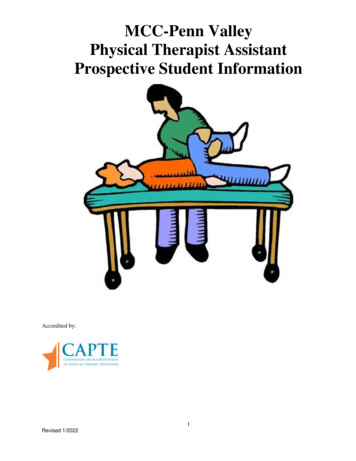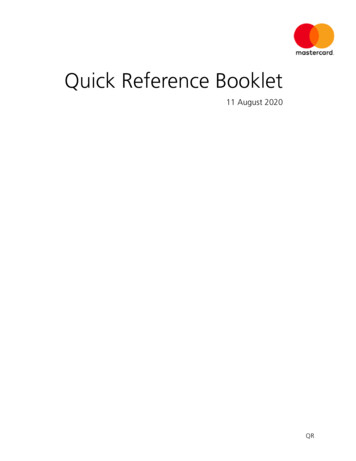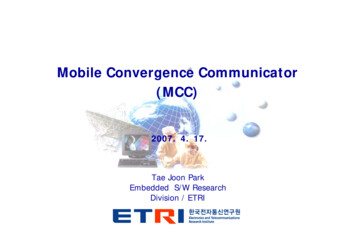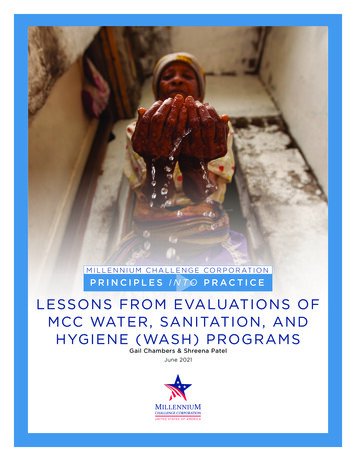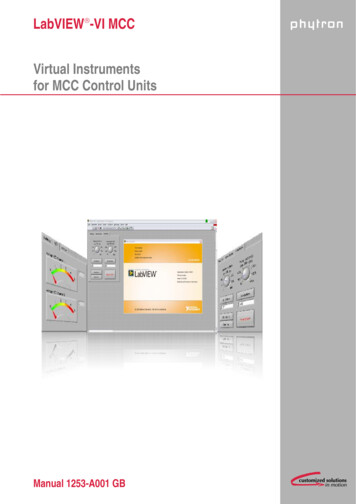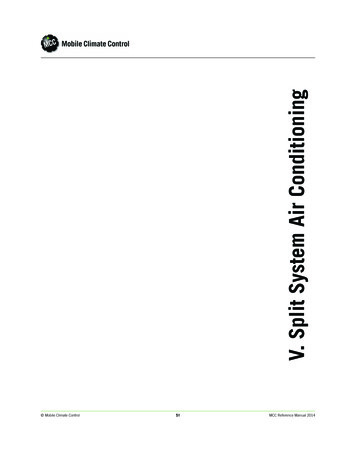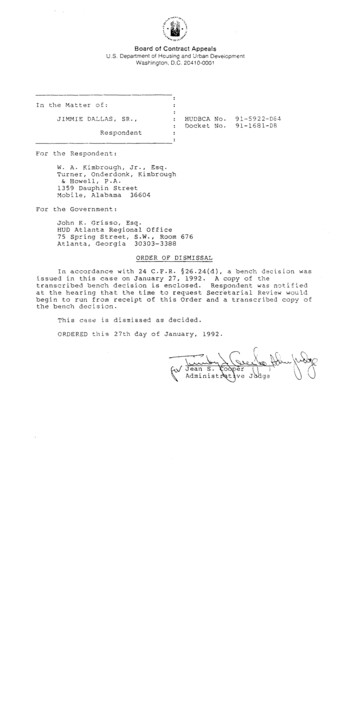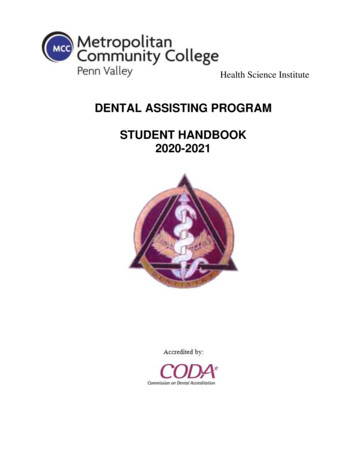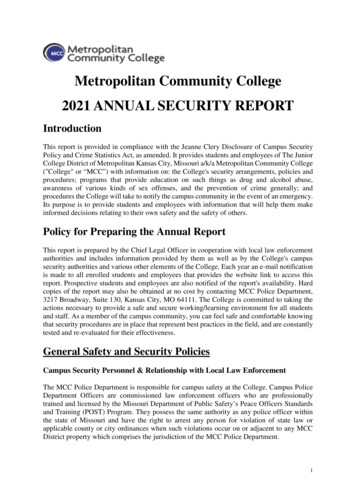
Transcription
Metropolitan Community College2021 ANNUAL SECURITY REPORTIntroductionThis report is provided in compliance with the Jeanne Clery Disclosure of Campus SecurityPolicy and Crime Statistics Act, as amended. It provides students and employees of The JuniorCollege District of Metropolitan Kansas City, Missouri a/k/a Metropolitan Community College("College" or “MCC”) with information on: the College's security arrangements, policies andprocedures; programs that provide education on such things as drug and alcohol abuse,awareness of various kinds of sex offenses, and the prevention of crime generally; andprocedures the College will take to notify the campus community in the event of an emergency.Its purpose is to provide students and employees with information that will help them makeinformed decisions relating to their own safety and the safety of others.Policy for Preparing the Annual ReportThis report is prepared by the Chief Legal Officer in cooperation with local law enforcementauthorities and includes information provided by them as well as by the College's campussecurity authorities and various other elements of the College. Each year an e-mail notificationis made to all enrolled students and employees that provides the website link to access thisreport. Prospective students and employees are also notified of the report's availability. Hardcopies of the report may also be obtained at no cost by contacting MCC Police Department,3217 Broadway, Suite 130, Kansas City, MO 64111. The College is committed to taking theactions necessary to provide a safe and secure working/learning environment for all studentsand staff. As a member of the campus community, you can feel safe and comfortable knowingthat security procedures are in place that represent best practices in the field, and are constantlytested and re-evaluated for their effectiveness.General Safety and Security PoliciesCampus Security Personnel & Relationship with Local Law EnforcementThe MCC Police Department is responsible for campus safety at the College. Campus PoliceDepartment Officers are commissioned law enforcement officers who are professionallytrained and licensed by the Missouri Department of Public Safety’s Peace Officers Standardsand Training (POST) Program. They possess the same authority as any police officer withinthe state of Missouri and have the right to arrest any person for violation of state law orapplicable county or city ordinances when such violations occur on or adjacent to any MCCDistrict property which comprises the jurisdiction of the MCC Police Department.1
The College has a close working relationship with local law enforcement agencies, includingthe Lee's Summit Missouri Police Department, the Kansas City Missouri Police Department,the Independence Missouri Police Department, and the Missouri Highway Patrol. MCC hasmutual aid agreements in place with the Kansas City Police Department, Independence PoliceDepartment, and Lee’s Summit Police Department related to calls for police service, crimeinvestigation, and information exchange.Campus Security AuthoritiesThe College has designated certain officials to serve as campus security authorities. Reports ofcriminal activity can be made to these officials. They in turn will ensure that the crimes arereported for collection as part of the College's annual report of crime statistics. The campussecurity authorities to whom the College would prefer that crimes be reported are listed below. Civil Rights Administrator; 3217 Broadway Suite 150, Kansas City, Missouri 64111;816.604.1575Athletic Director; Ayana Dunning; 3217 Broadway, Suite 401A, Kansas City,Missouri, 64111; 816.604.1059Director of Student Disability Services; Kim Fernandes; 3200 Broadway Kansas City,MO 64111- 2408; 816.604.1418Dean of Student Development & Enrollment (Penn Valley); Chelsia Potts; 3201Southwest Trafficway Kansas City, MO 64111-2727; 816.604-4134Dean of Student Development & Enrollment (Maple Woods); Terrell Tigner; 2601 NEBarry Road Kansas City, MO 64156-1254; 816.604-3175Dean of Student Development & Enrollment (Longview); Diana McElroy; 500 SWLongview Road Lee’s Summit, MO 64081-2105; 816.604-2326Dean of Student Development & Enrollment (Blue River and Business & Technology);John Burke; MCC-Blue River 20301 E. 78 Highway Independence, MO 64057-2053;(816) 604-6620; MCC- Business & Technology 1775 Universal Avenue Kansas City,MO 64120-1318Campus Police Captain (Penn Valley - HSI, AC, & BP and Maple Woods); RonaldReilly; 3201 SW Traffic Way, HU-101D, Kansas City, Missouri 64111, 816.604.4124;MCC-Maple Woods: 2601 NE Barry Road, ADM 107K, Kansas City, Missouri 64156,816.604.3055Campus Police Captain (Longview, Blue River, and Business & Technology); BrendaHasty; MCC-Longview: 500 SW Longview Road, LV-CC- 301, Lee’s Summit,Missouri 64081, 816.604.2073; MCC-Blue River: 20301 East 78 Highway, BR- CC118, Independence, Missouri 64057, 816.604.6437; MCC- Business & Technology:1775 Universal Avenue, TC-100, Kansas City, Missouri 64120, 816.604.5260Reporting a Crime or EmergencyThe College encourages accurate and prompt reporting of all criminal actions, emergencies, orother incidents occurring on campus, on other property owned by the College, or on nearbypublic property to the appropriate administrator and appropriate police agencies. Such a reportis encouraged even when the victim of a crime elects not to make a report or is unable to do so. Situations that pose imminent danger or while a crime is in progress should be reportedto local law enforcement by calling 911 from any campus phone or cell phone. Keep2
in mind that the individual making the call from a cell phone will need to provide theaddress where the emergency has occurred.Students, staff, and visitors should report criminal actions, accidents, injuries, or otheremergency incidents to one of the campus security authorities identified above. Oncereported, the individual making the report will be encouraged to also report it toappropriate police agencies. If requested, a member of College staff will assist a studentin making the report to the police.Anonymous reports of crime or other incident may be reported via the MCC web pageutilizing the MCC Cares link and completing the MCC Cares report form. Personalidentifiers are not required in order for the form to be completed/submitted. Callers mayalso call (816) 604-1111 or (816) 604-1200 or any of our campus police offices to reportcrimes anonymously.Reporting all crimes and public safety related incidents promptly to the Campus PoliceDepartment or appropriate law enforcement agencies is very important to MCCstudents, visitors, and employees.Reporting also helps the Campus Police Department and local police authoritiesapprehend those responsible. It helps MCC determine if a referral for disciplinary actionis required. It assists the Campus Police Department in the maintenance, and annualpublication, of accurate crime incident records with respect to the campuses. Thisinformation helps keep the campuses safer by providing the most accurate informationon criminal activity to members of the MCC community. Finally, the informationreported may be crucial for timely emergency procedures such as the evacuation ofbuildings (emergency procedures are posted at www.MCCKC.edu/alert and evacuationmaps are posted throughout campus buildings).Confidential ReportingThe College will protect the confidentiality of victims. Only those with a need to know theidentity for purposes of investigating the crime, assisting the victim or disciplining theperpetrator will know the victim's identity.Pursuant to the College’s sex discrimination and harassment policies, when an employee whois not a confidential reporter becomes aware of alleged misconduct under that policy(including, but not limited to, dating violence, domestic violence, sexual assault, and stalking),the employee is responsible for reporting that information to the Title IX Coordinator, withinthree calendar days. A victim of other types of crimes (e.g., aggravated assault, burglary, etc.)who does not want to pursue action within the College disciplinary system or the criminaljustice system is nevertheless encouraged to make a confidential report to a campus securityauthority. Upon the victim’s request, a report of the details of the incident can be filed with theCollege without revealing the victim’s identity. Such a confidential report complies with thevictim’s wishes, but still helps the College take appropriate steps to ensure the future safety ofthe victim and others. With such information, the College can keep an accurate record of thenumber of incidents involving members of the campus community, determine where a patternof crime may be developing and alert the community as to any potential danger. Theseconfidential reports are counted and disclosed in the annual crime statistics for the College.The College does not employ any pastoral or professional counselors and thus does not haveprocedures for these positions to inform the persons they are counseling of any procedures toreport crimes on a voluntary, confidential basis for inclusion in the annual disclosure of crimestatistics.3
Security of and Access to Campus FacilitiesOne of the most important methods to control crime is to control building access. For thatreason, access to campus buildings is limited to certain hours and all facilities are monitored.In the event students, faculty, or staff need access to a campus building after normal hours, theyshould contact the Campus Police Department for assistance.MCC campus building hours are as follows:MCC-Blue River7:00 a.m. to 10:00 p.m., Monday through Thursday; 7:00a.m. to 4:30 p.m. on Friday; and 8:00 a.m. to 1:00 p.m.SaturdayMCC-Business & Technology7:00 a.m. to 10:00 p.m., Monday through Thursday; and7:00 a.m. to 5:30 p.m. on Friday; and 7:3 0 a.m. to 4:30p.m. on SaturdaysMCC-Longview7:00 a.m. to 10:00 p.m., Monday through Thursday; 7:00a.m. to 6:00 p.m. on Friday; and 7:30 a.m. to 3:00 p.m.on SaturdayMCC-Maple WoodsMCC-Penn Valley7:00 a.m. to 10:00 p.m., Monday through Friday; and7:00 a.m. to 7:00 p.m. Saturday and Sunday7:00 a.m. to 10:00 p.m., Monday through Friday; and7:00 a.m. to 5:00 p.m. on SaturdayStudents and employees are asked to be alert and to not circumvent practices and proceduresthat are meant to preserve their safety and that of others: Do not prop doors open or allow strangers into campus buildings that have been securedDo not lend keys or access cards to non-students and do not leave them unattendedDo not give access codes to anyone who does not belong to the campus communityKeys to the offices, laboratories, and classrooms on campus will be issued to employees onlyas needed and after receiving the proper authorization.Employees must adhere to policies regarding unauthorized access to school facilities, theft of,or damage to, school property, or other criminal activity. In particular, rendering inoperable orabusing any fire prevention or detection equipment is prohibited. Violation of these policiesmay lead to disciplinary action, up to and including termination and the filing of charges withlaw enforcement authorities.Employee and student identification cards may be used to verify the identity of personssuspected to be in campus facilities without permission.4
Security Considerations in the Maintenance of FacilitiesMCC is committed to campus safety and security. Exterior lighting and landscape control is acritical part of that commitment. Campus Police Department officers conduct routine checksof lighting on campus during regular patrol duties. If lights are not functioning, they will initiatean immediate work request. The Campus Police Department officers also conduct routinechecks when opening and closing all campuses to include identifying and reporting anymalfunctioning doors, door locking mechanisms, or other issues that would constitute a safetyconcern for the MCC community, and work requests for identified concerns are immediatelygenerated. The MCC community is encouraged to report any deficiency in lighting andobserved or suspected safety and security deficiencies to the Campus Police Department at(816) 604-1200. Any concerns about physical security, particularly any locking mechanismdeficiency, should be reported to the Campus Police Department immediately. The CampusPolice and Facility Service Departments are available to respond to calls for service regardingunsafe facility conditions or for personal safety and property protection. These conditions mayinclude unsafe steps or handrails, unsafe roadways on campus, and unsecured equipment.Educational Programs Related to Security Awareness and Prevention ofCriminal ActivityThe College seeks to enhance the security of its campus and the members of the campuscommunity by periodically presenting educational programs to inform students and employeesabout campus security procedures and practices, to encourage students and employees to beresponsible for their own security and the security of others and to inform them about theprevention of crimes. These programs are discussed below.Crime Prevention & Awareness - Presented each semester to increase awareness of personalsafety practices on campus and in the community, foster engagement/interaction betweenstudents with the MCC police and counselors, and encourage students to thinkabout/implement behavioral change to promote their future personal safety.Student Orientation - Each semester student orientation includes information on emergencyprocedures at MCC including: locations of storm shelters and campus call boxes, and how tosign up for text alerts.New Employee Orientation - Each month that an orientation session occurs new employees areprovided with information from the MCC police department related to emergency proceduresat MCC including what to do in the event of: fire, smoke or explosion; weatheremergency/tornado; active shooter/violent intruder; lockdown; medical emergencies; utilityemergencies; bomb threats; and hazardous material spills.Bystander Intervention - Annual campus events that focus on understanding the purpose anduse of the training as being part of the MCC campus community. Learning how to recognizesituations of potential harm and how to overcome barriers of intervening. Identifying safe andeffective intervention options.Domestic Violence and Assault Awareness - Annual campus events presented to increaseawareness of domestic violence as an issue. Receive information on statistics on intimatepartner violence and how to identify the types or forms of abuse a domestic violence victim5
may experience. Gain a better understanding of "why" a victim chooses to stay or leave. Learnabout the availability of local resources.Another type of program is designed to inform students and employees about the preventionof crimes. A description of these follows:Active Shooter Response - Presented periodically. The program focuses on what to do in theevent of an active shooter on site including exiting area or sheltering in place.Special Safety Related Workshops - Presented periodically to include various topics such asself-defense tactics.Safety TipsFollowing these tips can help prevent you from becoming a victim of a crime. Stay in well-lit areas. Plan your route and use public sidewalks or walk midway betweencurbs and buildings away from alleys, entries and bushes. Avoid shortcuts throughparks, vacant lots and other deserted places.When possible, walk in groups – there is safety in numbers.Scan the area as you approach or leave buildings or parking lots.Consider carrying a personal safety alarm device.When approaching your vehicle, scan the immediate area.Have your keys in hand and scan the inside of your car before entering.Always lock your car doors upon entering or leaving your vehicle.Never leave your windows down (even a crack) in your parked car.Never leave your keys in an unattended car.Always keep your keys in your possession.Report missing keys immediately.Do not hide a key on or in your car.Never attach a tag with your name and address to a key ring.If you carry a handbag, keep it close to your body. If your bag is snatched, don’t fight.Make sure valuables are out of sight or locked in the trunk.Don’t leave vital information in your car - it provides personal information to acriminal.Report anyone who behaves suspiciously to the Campus Police Department.Advise the Campus Police or physical plant personnel of any hazards or securityconcerns.Follow your instincts – if your intuition tells you there is a risk, act accordingly.If you believe you are being followed, cross the street, change direction or vary yourpace. This might discourage the follower.As a rule, do not stop to give directions or other information to strangers.If you feel uncomfortable in an elevator, leave at the first chance you have. Don’t feel embarrassed or guilty for protecting yourself.While in class or office, keep personal belongings in view. Keep your purse either withyou or in a locked location.Do not remove rings to wash your hands – they can be forgotten and/or stolen.Carry only necessary credit cards and money.To access the 9-1-1 emergency number from a campus non-pay phone dial 8-911.6
Monitoring Off Campus Locations of Recognized Student OrganizationsThe College does not have any officially recognized student organizations with off campuslocations and therefore does not monitor or record criminal conduct occurring at such locations.Disclosure of the Outcome of a Crime of Violence or Non-Forcible Sex OffenseUpon written request, the College will disclose to the alleged victim of a crime of violence (asthat term is defined in section 16 of title 18, United States Code), or a non-forcible sex offense,the report on the results of any disciplinary proceeding conducted by the College against astudent who is the alleged perpetrator of such crime or offense. If the alleged victim is deceasedas a result of such crime or offense, the next of kin of such victim shall be treated as the allegedvictim for purposes of the paragraph.The previous paragraph does not apply to victims of dating violence, domestic violence, sexualassault, or stalking because under the Violence Against Women Act both the accused andaccuser in these cases are given the results without the need to make a written request.Drug and Alcohol PolicyMCC is committed to a safe, secure, healthful, drug-free work, campus, and communityenvironment, and has adopted the Drug-Free Schools and Communities Act and Drug-FreeWorkplace Act standards as part of its policies. All applicable alcohol regulations, includingfederal and state underage drinking laws, are enforced. The unlawful possession, use, and/orsale of alcoholic beverages are specifically prohibited, and violations carry substantialsanctions up to and including expulsion or termination of employment and/or referral forprosecution. MCC standards of conduct prohibit the unlawful possession, use or distributionof alcohol by students and employees on the college’s property or as part of any of its activities.Alcohol is permitted on college property only in certain limited circumstances when requiredapprovals have been obtained.The College enforces the state’s underage drinking laws and complies with state law andother applicable regulations governing alcoholic beverages for those on the College’s premisesor participating in its activities. The College strongly supports education and treatmentprograms as the most effective means to help prevent and reduce alcohol abuse. In addition,the College is committed to providing an academic and social environment that supportsindividual freedom while promoting individual responsibility, health and safety, andcommunity welfare. To that end:1. The College expects that those who wish to include alcohol as part of their activities will doso responsibly and lawfully.2. Persons planning events on campus should be mindful of the complexities introduced intoplanning an event with alcohol. Event management issues (the presentation of entertainment,provision of refreshments, management of the participants or audience, security, and otherfactors) require serious attention for any event, and all the more for an event at which alcoholis served. Event organizers must fully understand the College alcohol policy and applicablelaws and manage their events accordingly.7
3. Organizations may not plan events that promote or encourage the consumption of alcohol,nor may event planning be based upon the assumption of abusive or illegal alcoholconsumption. Persons planning events should remember that the vast majority of events at theinstitution take place without alcohol, that most members of the undergraduate community arenot of legal drinking age, and that among those who are, many do not drink alcoholic beveragesat all.MCC is committed to a safe, secure, healthful, drug-free work, campus, and communityenvironment, and has adopted the Drug-Free Schools and Communities Act and Drug-FreeWorkplace Act standards as part of its policies. The possession, sale, manufacture ordistribution of illegal drugs is prohibited under both state and federal laws. All applicable drugregulations, including federal and state laws, are enforced. Such laws will be enforced by theCollege's law enforcement authority on campus (MCC Police Department). The unlawfulpossession, use, and/or sale of illegal drugs are specifically prohibited, and violations carrysubstantial sanctions up to and including expulsion or termination of employment and/orreferral for prosecution. MCC standards of conduct prohibit the unlawful possession, use ordistribution of illicit drugs by students and employees on the college’s property or as part ofany of its activities.In accordance with MCC board policy to provide a safe, secure, healthful, drug free work,campus, and community environment, employees are expected and required to report to workand participate in district activities, and students are expected and required to attend classesand participate in district activities, in appropriate mental and physical condition. Further,students and employees are expected to abide by MCC regulations related to the misuse ofalcohol and other drugs and the unlawful possession, use, or distribution of illicit drugs andalcohol.The appropriate vice chancellor or designee will be responsible for notifying all students andemployees of policies and regulations related to providing a drug free workplace, campus, andcommunity.Federal Drug LawsDenial of Federal Benefits (21 U.S.C. § 862) A federal drug conviction may result in the lossof federal benefits, including school loans, grants, scholarships, contracts, and licenses. Federaldrug trafficking convictions may result in denial of federal benefits for up to five years for afirst conviction. Federal drug convictions for possession may result in denial of federal benefitsfor up to one year for a first conviction and up to five years for subsequent convictions,successful completion of a drug treatment program, including periodic testing, and appropriatecommunity service, or any combination of the three.Forfeiture of Personal Property and Real Estate (21 U.S.C. § 853) Any person convictedof a federal drug offense punishable by more than one year in prison shall forfeit to the UnitedStates any personal or real property related to the violation. A warrant of seizure may be issuedand property seized at the time an individual is arrested on charges that may result in forfeiture.Federal Drug Trafficking Penalties (21 U.S.C. § 841) Penalties for federal drug traffickingconvictions vary according to the type and quantity of the controlled substance involved in thetransaction. Penalties for subsequent convictions are more severe.8
In the case of a controlled substance in schedule I or schedule II, GHB, or flunitrazepam, aperson shall be sentenced to a term of imprisonment of not more than 20 years. If death orserious bodily injury results from the use of a controlled substance which has been illegallydistributed, the person convicted on federal charges of distributing the substance faces thepossibility of a life sentence and fines ranging up to 10 million.In the case of a controlled substance in schedule III, a person shall be sentenced to a term ofimprisonment of not more than 10 years, and if death or serious bodily injury results, shall besentenced to a term of imprisonment of not more than 15 years or a fine not to exceed 500,000,or both, for a first offense.For less than 50 kilograms of marijuana, the term of imprisonment shall not be more than fiveyears, and the fine shall not be more than 250,000, or both, for a first offense.In the case of a schedule IV substance, the term of imprisonment shall not be more than fiveyears, and the fine shall not be more than 250,000, or both, for a first offense.Persons convicted on federal charges of drug trafficking within 1,000 feet of an elementaryschool, secondary school, college, or university (21 U.S.C. § 860) face penalties of prison termsand fines which are twice as high as the regular penalties for the offense, with a mandatoryprison sentence of at least one year, unless the offense involves five grams or less of marijuana.Federal Drug Possession Penalties (21 U.S.C. § 844) Persons convicted on federal chargesof possessing any controlled substance face penalties of up to one year in prison, a mandatoryfine of no less than 1,000, or both. Second convictions are punishable by not less than 15 daysbut not more than two years in prison and a minimum fine of 2,500. Subsequent convictionsare punishable by not less than 90 days but not more than three years in prison and a minimumfine of 5,000.Drug and Alcohol State LawsCategoryPossession ofMarijuanaControlledSubstancesSummary (Missouri Revised Statues)The use of recreational marijuana is illegal, and possession for personaluse of less than 10 grams for a first offense is a misdemeanor with amaximum fine of 500 and no jail time. For a second offense, themaximum fine is 2,000 and up to one year in jail. Possessing more than35 grams is a felony with a maximum fine of 10,000 and up to 7 years injail. See MO. REV. STAT. § 579.015. Medical marijuana for certainconditions is allowed, and up to four ounces may be purchased every 30days. Mo. Code Regs. Ann. tit. 19, § 30-95.030.Missouri statutes cover a wide range of offenses related to the possessionand delivery of controlled substances. See MO. REV. STAT. §§ 579.015 –579.040. Possession of a controlled substance, except thirty-five grams orless of marijuana, is a Class D felony, with a term of up to seven years anda fine up to 10,000. See MO. REV. STAT. § 579.015. Delivery of acontrolled substance other than 35 grams or less of marijuana is a Class Cfelony, resulting in a prison term of not less than 3 years and not morethan 10 years, and a fine up to 10,000. MO. REV. STAT. §§ 558.002,558.011.9
CategorySummary (Missouri Revised Statues)As an example, someone possessing methamphetamine faces a prison termof 7 years and a fine up to 10,000.In Missouri, it is illegal for anyone under the age of 21 to possess,purchase, or attempt to purchase any intoxicating liquor, subject to a finenot to exceed 500. See MO. REV. STAT. § 311.325. A subsequentviolation is a Class A misdemeanor, subject to a term of up to one year inAlcohol andjail and a fine not to exceed 2,000. Id. Anyone between 17–21 whoMinorsrepresents that she/he is 21 for the purpose of obtaining intoxicating liquoris guilty of a misdemeanor. MO. REV. STAT. § 311.320. The use of afake identification is subject to a 500 fine. Id. An attempt to purchase, orpossession of alcohol, may also result in license suspension.A person is guilty of a DUI if the person has a blood alcohol concentrationof 0.08 percent. A first offense results in a suspended license for 30 daysDriving Under the and then a restricted license for 60 days, and may require a certifiedInfluence (DUI) ignition interlock device. MO. REV. STAT. § 302.525. A second offensewithin five years results in a one-year restricted license and additionalpenalties.Drug and Alcohol Abuse Prevention ProgramThe Drug-Free Schools and Communities Act (DFSCA) requires that, as a condition ofreceiving funds or any other form of financial assistance under any federal program, theCollege is to collect information regarding drug and alcohol prevention policies, proceduresand programs for students and college employees both on school premises and as part of anyof its activities.In order to certify its compliance with the regulations, the College must adopt and implementa drug prevention program to prevent the unlawful possession, use, or distribution of illicitdrugs and alcohol by all students and employees both on school premises and as part of any ofits activities.Creating a program that complies with the regulations requires institutions to do the following: Prepare a written policy on alcohol and other drugs.Develop a sound method for distribution of the policy to every student, faculty and staffmember each year.Prepare a biennial review report on the effectiveness of its alcohol and other drugprograms and the consistency of policy enforcement.Maintain its biennial review report on file so that it can be submitted, if requested bythe U.S. Department of Education, other entity or individualThe College continues to remain in compliance with the requirements of the Drug-Free Schoolsand Communities Act. The institution has adopted and implemented programs to prevent theabuse of alcohol and use or distribution of illicit drugs by students and employees on itspremises and as a part of any of its activities, as demonstrated through this biennial review.Also, MCC has a policy on alcohol and other drugs (AOD) and has developed a thoroughmethod for d
MCC is committed to campus safety and security. Exterior lighting and landscape control is a critical part of that commitment. Campus Police Department officers conduct routine checks of lighting on campus during regular patrol duties. If lights are not functioning, they will initiate an immediate work request.

